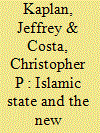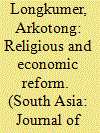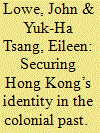| Srl | Item |
| 1 |
ID:
142530


|
|
|
|
|
| Summary/Abstract |
This article focuses on the apocalyptic zeitgeist of the Islamic State through the lens of what we call the New Tribalism. It finds that IS emerged from the Al Qaeda (AQ) milieu, but soon split with AQ as the messianic excitement surrounding Al-Baghdadi and his teachings grew. In common with previous millennial/messianic movements in all three “Peoples of the Book”—Judaism, Christianity, and Islam—IS soon evolved beyond the laws of the normative faith (antinomianism). We hold that for this reason, despite its claims of faith and fealty, IS has left the Islamic Umah behind, becoming a malign sectarian group of its own whose dynamism and successes are attracting a global audience and support from Muslims in almost every country. This helps to explain such abhorrent practices as forced conversion, sexual servitude, the destruction of historic artifacts, and mass executions. We find that the American invasion of Iraq was the vital first step in a series of events, which gave birth to IS. A thorough review of IS history and political culture traces these historic moments in time.
|
|
|
|
|
|
|
|
|
|
|
|
|
|
|
|
| 2 |
ID:
080584


|
|
|
|
|
| Publication |
2007.
|
| Summary/Abstract |
The Heraka or Gaidinliu Movement among the Zeme Nagas of the North Cachar Hills, Assam, provides a case of millenarian activities based on agrarian reforms. The movement is associated with opposing British rule during the 1930s until India's Independence in 1947 under the guidance of Jadonang and later Gaidinliu. I examine the genesis of the movement which was based on agrarian reform by linking it with the influx of Kuki people and the effect of British land policy on Zeme agricultural practices which caused land shortages and famine. I argue that the Heraka Movement provided an alternative by abolishing certain rituals associated with the agricultural cycle and this in turn changed the social hierarchies and the worldview of the Zeme.
1 This paper was first presented at the 2006 European Conference of Modern South Asian Studies, organised by the European Association for South Asian Studies (EASAS) at Leiden University (Panel 28: Ethnicity and Development: Tribes and Small Peoples of India). I am grateful to Tahulung and Adeule for helping me understand the 'Zeme world'. I am thankful to Paul Streumer, Mohan Gautam, Lindsay Graham, Jeanne Openshaw, Amanda Bowden, Mark Turin, Steven Sutcliffe, Vibha Joshi and Erik de Maaker for their comments and feedback
|
|
|
|
|
|
|
|
|
|
|
|
|
|
|
|
| 3 |
ID:
162542


|
|
|
|
|
| Summary/Abstract |
The Umbrella Movement in Hong Kong is the most radical political movement to have taken place in the former British colony since 1967 anti-colonial demonstrations. Using empirical evidence obtained from activists who participated in the Umbrella Movement, this paper explains how Hong Kong’s youth are looking simultaneously to both the past and future to secure their identity in the colonial past even as some hope to achieve ultimate secession from Mainland rule. Racism and anti-Mainland hostilities in Hong Kong are the result of nostalgia and the insurrectionary impulse akin to the millenarianism of social movements founded on suffering and loss that continually seek the recovery of pasts of which they are now deprived. We illuminate how, to young activists, the Umbrella Movement presents hope for a future embedded in the past that remains one the territory and former colony may still aspire toward.
|
|
|
|
|
|
|
|
|
|
|
|
|
|
|
|